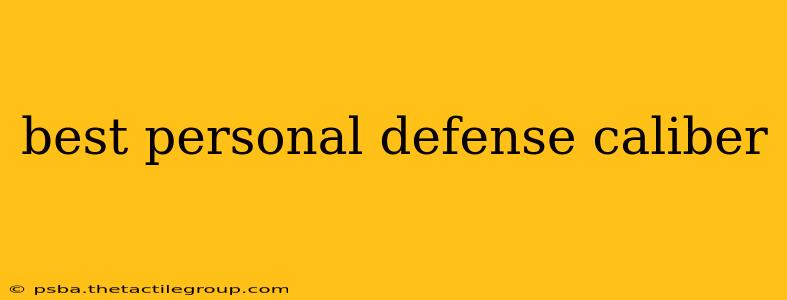Choosing the right caliber for personal defense is a crucial decision, impacting your safety and effectiveness in a self-defense situation. There's no single "best" caliber, as the ideal choice depends on individual factors like hand size, shooting experience, and personal preferences. However, this guide will delve into the most popular and effective calibers, helping you make an informed decision.
Factors to Consider When Choosing a Caliber
Before we dive into specific calibers, let's examine the key factors that influence the best choice for personal defense:
1. Ballistics:
- Stopping Power: This refers to a round's ability to immediately incapacitate an attacker. Larger calibers generally offer greater stopping power due to heavier projectiles and more significant energy transfer.
- Penetration: The ability of a round to penetrate clothing, barriers (like car doors), and the target. Excessive penetration poses a risk to bystanders, while insufficient penetration may not stop a threat. The ideal balance is crucial.
- Expansion: Many self-defense rounds are designed to expand upon impact, increasing their stopping power and reducing over-penetration. This expansion is often facilitated by hollow-point or other specialized bullet designs.
- Recoil: Heavier calibers produce greater recoil, which can affect accuracy, especially for less experienced shooters. Excessive recoil can also lead to difficulty controlling the firearm during rapid firing.
2. Shooter Factors:
- Experience Level: Beginners may find larger calibers challenging to manage due to recoil. Smaller calibers offer a gentler learning curve.
- Physical Strength: Individuals with less upper body strength may struggle with the recoil of larger calibers.
- Hand Size: Smaller hands may find larger firearms difficult to grip and control comfortably.
3. Concealed Carry Considerations:
- Size and Weight: If carrying concealed, the size and weight of the firearm and ammunition are critical factors. Smaller, lighter calibers are generally preferred for concealed carry.
- Capacity: Magazine capacity influences how many rounds you can fire before reloading, a critical factor in a self-defense situation.
Popular Calibers for Personal Defense
Now let's explore some of the most commonly used calibers for personal defense:
9mm Luger:
- Pros: High capacity magazines, manageable recoil, readily available ammunition, affordable, and widely used, leading to extensive training resources.
- Cons: May require precise shot placement for optimal stopping power compared to larger calibers.
.40 S&W:
- Pros: More stopping power than 9mm, still relatively manageable recoil for many shooters.
- Cons: Higher recoil than 9mm, often lower capacity magazines, and can be more expensive than 9mm ammunition.
.45 ACP:
- Pros: High stopping power, large projectile diameter, substantial energy transfer.
- Cons: Significant recoil, lower capacity magazines compared to 9mm and .40 S&W, and can be more expensive.
.380 ACP:
- Pros: Small and lightweight, easy to conceal, manageable recoil, suitable for smaller-framed individuals.
- Cons: Lower stopping power compared to larger calibers, limited ammunition capacity.
.22 LR:
- Pros: Very low recoil, inexpensive ammunition, lightweight, and high capacity. Suitable for smaller-framed individuals and those new to firearms.
- Cons: Lowest stopping power among the calibers listed, requires precise shot placement. Generally considered unsuitable for serious self-defense situations by many experts.
Conclusion: The Best Caliber is Personal
Ultimately, the "best" personal defense caliber is subjective and depends heavily on individual factors. Thorough research, hands-on experience at a shooting range with various calibers, and professional guidance from a firearms instructor are essential to making an informed and responsible decision. Remember that responsible gun ownership includes proper training, safe handling practices, and a deep understanding of applicable laws and regulations.

